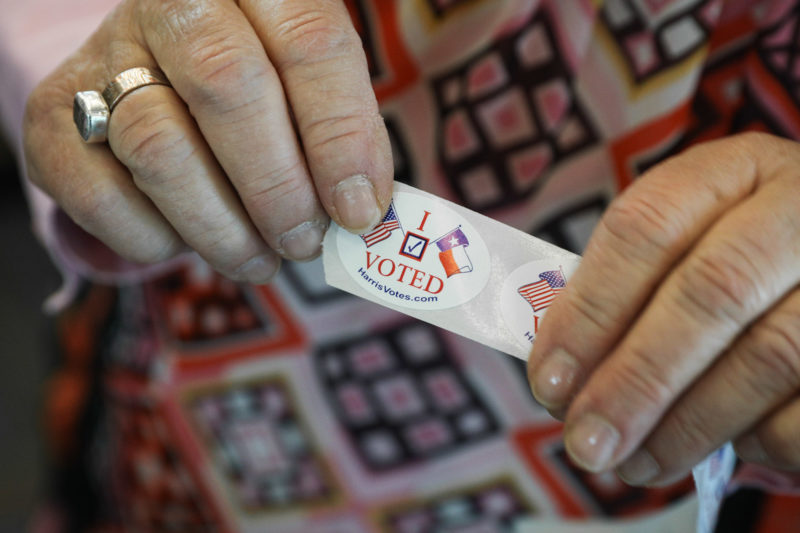19 Black Women Judges Swept to Victory in Texas. Here’s Why It Matters.
Adding women of color to judicial seats in Harris County, Texas, not only bolsters racial diversity on the bench, but could affect bail reform and housing cases.

While Texas Republicans held on to statewide seats in last week’s midterms, Democrats made sweeping gains in the judiciary, flipping four influential state appeals courts in Austin, Houston, and Dallas.
The election day wins could change the state’s judicial landscape, as all 59 Democratic judges who ran in Harris County, one of the most populous and diverse counties in the United States, won their races.
In Harris County, which encompasses most of Houston, 19 Black women running for various judicial seats ousted their Republican incumbent opponents, marking the biggest electoral victory for Black women in U.S. history.
“We want to definitely turn Harris county upside down in criminal justice reform,” Erica Hughes, elected to a criminal court position in last week’s midterms, wrote in a Facebook post, the Guardian reports.
Women of color make up less than 20 percent of state judges, according to data collected by the American Constitution Society, a national progressive organization. Adding 19 women of color to judicial seats in Harris County not only increases racial diversity on the bench, but could have an effect on bail reform and housing cases, said Mark Jones, a professor of political science at Rice University in Houston.
“It’s going to have a profound impact on things like bail reform, because up until this election we still had several Republican judges fighting some bail reforms,” Jones said. “Now you’ve got people who hold progressive positions on a host of issues relating to minority rights and the role of race and ethnicity in the criminal justice system, so you’re going to have more favorable opinions toward cases where there are claims of racial profiling or bias.”
County judges play a role in overseeing local election procedures, signing off on bail amounts and in jury selection. They also play a fundamental role in eviction cases, Jones said.
“The previous Republican judges tended to side mainly with landlords. Now you’re going to have far greater focus on the rights of tenants,” Jones said. “An eviction has a tendency to push someone off into homelessness because they have an eviction on their credit report and it is now very difficult for them to find housing. A Democratic judge in that same position might try to work out a consensual agreement between the tenant and the landlord.”
Texas Democrats after the midterms hold majorities in seven of the state’s 14 appeals courts, including the two appeals courts that serve Houston. State appeals courts serve as intermediate courts in Texas, sitting between the state’s many trial courts and its two high courts—the Texas Supreme Court and the Texas Court of Criminal Appeals, both of which remain in Republican control.
Even with greater Democratic control in appeals courts, the outcome of cases related to reproductive rights may not change much given the Republican makeup of the state’s two highest courts, Jones said. The scope of these cases, however, may be affected since appellate courts can make it more or less likely a case gets to the Texas Supreme Court.
“Judges don’t rule exactly by the law. They rule by their opinion and interpretation of the law,” Jones said. “So if something comes out of the Fifth Appeals Court or First or 15th with a more progressive majority, judges on the [Texas] Supreme Court or the Criminal Court of Appeals may approach it differently.”
The victories of so many Democratic judges in Harris County and elsewhere in the state are a result of Texas’ straight-ticket voting system, Jones said. Texas is one of two states that initially elects and then re-elects its judges in partisan elections where voters have the option of casting a straight-ticket vote. As a result, judicial election sweeps are more likely, and it’s not unusual to see one party win all the judicial races within a jurisdiction. This year’s midterms saw unusually high turnout too, eclipsing 2014 midterm election turnout by almost 20 percent in Texas.
“You wouldn’t want to interpret this as somehow Harris County residents were upset with the judicial system and wanted to sweep in new Democrats as judges,” Jones said. “They were maybe voting for Beto O’Rourke or against Donald Trump and as a result cast a straight Democratic ballot.”
The recent midterm election was the last for straight-ticket voting in Texas, which will come to an end in 2020.
